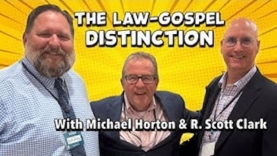The twenty-first century is not the first to witness English-speaking theologians in the Reformed tradition expressing dissatisfaction with the Reformation’s doctrine of justification through faith alone on the ground of Christ’s righteousness and sacrifice alone. Continue reading →
Video: Law And Gospel Distinction
In this episode of “No Compromise Radio” Pastor Mike Abendroth delves into the essential distinction between Law and Gospel, breaking down its theological significance and practical application for believers. Using insights from his new book “Law & Gospel: A Primer”, Mike explains . . . Continue reading →







